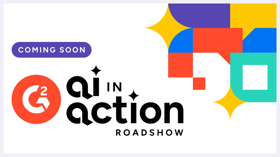April 17, 2025
 by Alexandra Vazquez / April 17, 2025
by Alexandra Vazquez / April 17, 2025

AI is giving finance a serious upgrade.
It’s automating tasks, speeding up close cycles, and generally making life a little easier for accountants everywhere. But when robots start making decisions that impact your bottom line, things get real.
That’s where auditable AI comes in: the secret weapon to making sure your AI tools are smart and accountable.
To break it all down, we spoke with Mike Whitmire, Co-founder and CEO of FloQast, a leading accounting platform. In this Professional Spotlight, Mike shares what led him to start FloQast, how AI is being used in financial management today, and why making AI auditable is no longer optional.
This interview is part of G2’s Industry Insights series. For more content like this, subscribe to G2 Tea, a weekly newsletter with SaaS-y news and entertainment.
Can you walk us through your career journey? What experiences led you to co-found your company and focus on accounting software?
Accounting is in my blood. My mom is an accountant who runs a bookkeeping firm and provides business consulting for small businesses and family offices in Los Angeles. And my dad is a tax attorney turned author who writes books about taxation law.
When I started college, I initially pursued film, which was obviously unrelated to what I do now. Along the way, I discovered the business program and took an accounting course. I realized I was good at it and found it interesting, so I decided to major in accounting.
After graduating, I followed the traditional path: joined a Big Four audit firm, worked there for a few years, earned my CPA license, and then transitioned out of audit. I wanted to gain experience at a pre-IPO company to see what that process looked like behind the scenes, but the opportunity to work more regular hours was also quite appealing.
At the time, finding such opportunities in LA wasn’t easy, but in 2009, I joined a company called Cornerstone OnDemand. They had just taken on a round of venture funding and were planning to go public within 12 to 18 months. I loved it. I was the 95th employee and the fifth person on the accounting team. Over three years, I helped scale the company, took part in the IPO process, and saw the accounting team grow to about 60 people.
It was an incredible learning experience that ultimately led me to start my own company, FloQast. Having worked in accounting, I quickly saw the inefficiencies of outdated, and often manual, workflows. I experienced firsthand the frustrations that came with this — the long hours, the headaches, and the burnout, especially during the month-end close, which was always a painful process. I knew there had to be a better way to handle all this.
That realization pushed me to look for more efficient methods to alleviate those frustrations. My partners and I set out to create a solution that would improve efficiency across various areas of accounting workflows. In 2013, we launched FloQast with a simple but powerful vision: to build the product we wished we had during our early careers when we were putting in those extra hours to close the books.
For those who don’t know, tell us a bit about what auditable AI is. When did you first recognize the need for it in finance?
Auditable AI refers to artificial intelligence systems designed with transparency, accountability, and compliance in mind. It’s AI that doesn’t operate as a “black box” but instead provides clear, traceable processes and outputs that can be independently verified. This is especially critical in fields like accounting, where accuracy, trust, and regulatory compliance are non-negotiable.

Join industry leaders at G2's free AI in Action Roadshow for actionable insights and proven strategies to reimagine your funnel. Register now
I first recognized the need for auditable AI when generative AI tools began gaining traction. The moment I saw how these systems could process vast amounts of data and generate outputs in seconds, I thought, “How will we verify this?” If AI spits out numbers or recommendations, auditors and accountants still need to ensure those results are accurate and compliant. Without auditable AI, the profession risks trading efficiency for accountability — a trade-off we simply can’t afford.
That's when it became clear: we needed AI systems in accounting that were designed from the ground up to be auditable — systems that maintain documentation trails, preserve decision logic, and operate in ways that external parties can meaningfully verify.
How are AI-powered tools currently being used in corporate accounting and financial management?
AI-powered tools are already transforming accounting in profound ways. Today, they’re being used to automate repetitive, time-consuming tasks like data entry, reconciliations, and journal entry preparation, freeing up accountants to focus on higher-value strategic work. AI is also helping teams analyze large volumes of financial data more efficiently, uncovering insights that drive better decision-making and improve business outcomes.
However, the real potential lies in AI’s ability to adapt to the unique needs of each organization. At FloQast, we’re taking this a step further with our AI Agents, which not only automate workflows but also allow accounting teams to customize and build their own solutions. This level of flexibility is critical in a field as complex and ever-changing as accounting.
The reality is that AI is quickly becoming a necessity. With the growing talent gap and increasing workloads, organizations that fail to adopt AI risk falling behind. At FloQast, we’re committed to delivering AI solutions that accountants can trust, ensuring they have the tools they need to thrive in this new era of finance.
Ultimately, our goal is to put accountants in control of building their own trustworthy AI processes so they can evolve from preparers into strategic reviewers — a role that is becoming more crucial in organizations with limited resources and experiencing unpredictable external challenges.
One big obstacle is the talent shortage within the accounting profession. While AI won’t replace accountants, adapting AI-powered solutions will maintain productivity and give them more time to focus on high-impact work that drives business strategies forward.
What are the key risks associated with AI in financial processes, and why is it so important to ensure AI is auditable?
The key risks revolve around accuracy, transparency, and compliance.
First, AI is only as good as the data it’s trained on, and if that data is flawed or biased, the outputs will be too. This can lead to significant financial errors or misreporting. When it comes to transparency, many AI systems, especially large language models (LLM), operate as “black boxes,” making it difficult to understand how they arrive at their conclusions. This lack of clarity can erode trust and make it nearly impossible to verify results.
There’s also the risk of non-compliance. Standards like ISO 42001 reflect the growing recognition that AI systems must adhere to the same verification principles as human processes.
This is why auditable AI is so critical. It ensures that AI systems are transparent, traceable, and accountable. Auditable AI provides clear trails showing how conclusions were reached, who reviewed them, and what controls were in place.
Without auditable AI, we risk undermining the very foundation of trust that the accounting profession is built on. At FloQast, this isn’t theoretical. We've built auditability into our AI Agents from the ground up because we understand that automation without accountability is a non-starter for accounting teams.
Are there existing regulations around auditing AI in accounting? Do you foresee new compliance requirements emerging?
Currently, there aren’t specific, universally adopted regulations solely focused on auditing AI in accounting. But several existing frameworks, like Sarbanes-Oxley (SOX) and GDPR, already impose requirements around data accuracy, transparency, and accountability, which indirectly apply to AI systems. For example, SOX mandates that companies maintain internal controls over financial reporting, and if AI is involved in those processes, it must be auditable to ensure compliance.
That said, new standards are emerging to address the unique challenges of AI. For instance, at FloQast, we’ve made ISO 42001 central to our approach. This is the first international standard specifically targeted at AI management systems, and we are among a small group of organizations that have achieved this milestone certification.
While not exclusively for financial applications, ISO 42001 provides critical guardrails around AI governance, risk management, and bias mitigation. The standard requires organizations to establish clear AI policies, conduct impact assessments, implement rigorous monitoring, and maintain complete documentation of AI systems — all principles that are deeply aligned with accounting’s inherent need for control and verification.
While ISO 42001 could become the gold standard, I do foresee other compliance requirements emerging as AI adoption grows. Regulators are already paying closer attention to how AI is used in sensitive areas like finance, and it’s only a matter of time before more specific rules are introduced. The key for organizations is to stay ahead of the curve by adopting auditable AI now, ensuring they’re prepared for whatever regulatory changes come next.
What steps should corporate accounting teams take to make AI-powered processes more auditable?
By establishing clear frameworks and controls, accounting teams can make systems more auditable and avoid any potential risks. Here are five key steps:
What advancements do you see in the future for AI in corporate accounting? How should businesses prepare?
We're heading toward a world where AI systems will handle complex financial workflows end-to-end, fundamentally shifting what it means to be an accountant. For instance, we’re at a point where AI systems will be able to manage the entire month-end or year-end close processes. This will essentially change the accountant’s role from preparer to strategic reviewer/advisor.
I also see AI evolving to become more anticipatory and interconnected with systems that don’t just process what happened yesterday but help us understand what’s likely to happen tomorrow. The technology will become more collaborative, but it will always need to maintain the strict security and governance standards that the accounting profession demands.
Throughout history, our profession has embraced new tools that enhance our capabilities. AI is the next step in this journey. Organizations that succeed in this new era will be those that earn trust by balancing AI’s power with human judgment and strategic thinking.
Subscribe to G2 Tea, our SaaS-y newsletter with tech insights and tidbits from industry professionals like Mike!
Follow Mike Whitmire on LinkedIn to learn more about his extensive knowledge in the industry and how he is pushing the boundaries of what's possible with customer relationship management.
Edited by Supanna Das
Alexandra Vazquez is a former Senior Content Marketing Specialist at G2. She received her Business Administration degree from Florida International University and is a published playwright. Alexandra's expertise lies in copywriting for the G2 Tea newsletter, interviewing experts in the Industry Insights blog and video series, and leading our internal thought leadership blog series, G2 Voices. In her spare time, she enjoys collecting board games, playing karaoke, and watching trashy reality TV.
Financial crime doesn’t wait for anyone. Whether it’s fraud, money laundering, or suspicious...
 by Alexandra Vazquez
by Alexandra Vazquez
The AI landscape just got more interesting.
 by Tanushree Verma
by Tanushree Verma
Will the art of selling become another casualty of automation?
 by Tanushree Verma
by Tanushree Verma
Financial crime doesn’t wait for anyone. Whether it’s fraud, money laundering, or suspicious...
 by Alexandra Vazquez
by Alexandra Vazquez
The AI landscape just got more interesting.
 by Tanushree Verma
by Tanushree Verma


